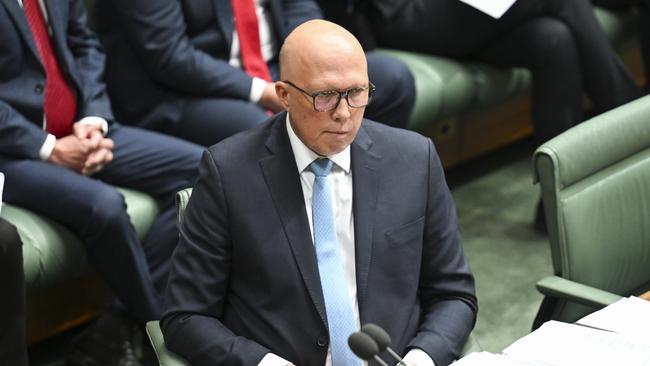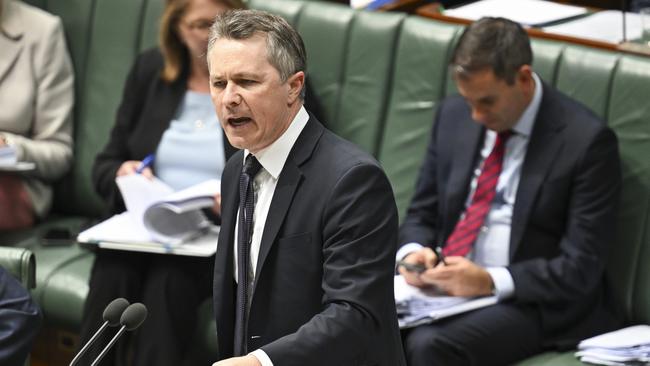Coalition sinks Anthony Albanese’s plan to cap international students
Peter Dutton’s decision to block Labor’s cap on international students has created a chasm in the nation’s higher education sector.

Peter Dutton’s decision to block Labor’s cap on international students has created a chasm in the higher education sector, with sandstone institutions declaring a win and the country’s regional and technical colleges warning they will be billions of dollars worse off under the migration status quo.
In a major blow to Anthony Albanese’s plan to curb net migration by limiting the number of foreigners universities can enrol next year, the Coalition said on Monday it would join the Greens in voting against the “chaotic and confused” legislation in the Senate.
The plan to cap international students at 270,000 has been criticised by the higher education sector for inflicting economic damage, triggering job losses and damaging the reputation of the nation’s second biggest export sector. But many in higher education have come to view the proposal as preferable to continuing to recruit international students under Ministerial Direction 107, which prioritises visa applications from students who have offers to stay from “low-risk” education providers such as the Group of Eight universities.
With less than two parliamentary sitting weeks before the caps were due to begin on January 1, Education Minister Jason Clare said the controversial measure would remain in place if the legislation imposing the caps did not pass the parliament. “If the bill doesn’t go through the Senate, then the de facto cap, which is Ministerial Direction, 107, stays,” Mr Clare said on Monday.
Direction 107 was introduced by former home affairs minister Clare O’Neil in December, and has led to a significant decline in the number of international student visas being granted from a record 577,295 in 2022-23 to 376,731 in 2023-24.
Mr Clare criticised the Opposition Leader for withdrawing the Coalition’s support for the legislation after he said in his budget reply speech in May that he supported a foreign student cap, branding Mr Dutton a “fraud” whose word cannot be trusted.
“You can’t talk tough on immigration and then go soft on this,” Mr Clare said. “You can’t talk tough on immigration, and then vote against putting a limit on the number of people that come to this country every year.”

The opposition’s education spokeswoman Sarah Henderson, immigration spokesman Dan Tehan and home affairs spokesman James Paterson said they would not support the legislation because it would ultimately fail to address the housing crisis.
“Labor’s piecemeal approach does nothing to address the structural issues it has created,” they said. “The proposed cap in the education bill before parliament will not even touch the sides of this problem. We cannot support measures which will only serve to compound this crisis of the government’s making. Based on their record so far we have absolutely no confidence the government is capable of fixing its immigration mess. Labor simply cannot be trusted on immigration.”
Amid soaring international student numbers – almost 675,000 were in the country at the end of September – migration has become a heated political issue. Mr Dutton has vowed to cut permanent migration to 140,000 and net migration to 160,000 if elected. The Australian understands the Coalition plans to introduce its own international student policy.
Greens higher education spokeswoman Mehreen Faruqi said the opposition announcement was a win for the sector. The minor party has opposed the caps since their inception on the grounds they scapegoated international students for the housing crisis. “Literally everyone except Labor was opposed to international student caps because they would decimate the sector, harm international students and our reputation and result in massive job and economic losses,” Senator Faruqi said. “This was always a migration bill disguised as education policy in Labor’s bid to win a race to the bottom with the Coalition on migration.”
University Australia chief executive Luke Sheehy called on Labor to scrap Direction 107, accusing both sides of politics of waging a “phony war” on international students by blaming them for the housing shortage. He said the direction, which primarily affected regional and outer-suburban providers, had caused the sector to lose almost 60,000 students and cost the economy more than $4bn since its introduction.
“The parliament today has decided that the war on the international education sector in this country will continue,” Mr Sheehy said. “Since just before Christmas last year, our university sector has been the victim of the sledgehammer approach to the student visa processing system, under Ministerial Direction 107.
“The government promised that we will get relief from this Ministerial Direction 107 with the student caps bill, and the parliament has decided that pain will continue.”
Group of Eight chief executive Vicki Thomson, who represents the nation’s elite universities including Sydney, NSW and the Australian National University, said her members were “reasonably happy” to have the chance to reconsider the measures. Next year’s caps represented a 28 per cent cut in international enrolments for the Go8 at a cost of $1bn in lost revenue.
“Generally, I think that common sense has prevailed as it relates to this piece of legislation. And I think it’s a win for our universities and the economy. It removes the uncertainty,” Ms Thomson said.
International Education Association of Australia chief executive Phil Honeywood said the Coalition, having withdrawn its support to Labor’s plan, must provide an alternative, raising concerns that providers will continue to suffer under the “vagaries” of Direction 107.
“This legislative mess underlines that Australia has provided no clarity for young people deciding where they’re going to study overseas,” Mr Honeywood said.
“The onus is now very much on the Greens and the Coalition to provide an alternative policy road map, so that our $40bn industry knows where we stand.”
Western Sydney University vice chancellor George Williams said the caps were “fundamentally flawed” and he welcomed the chance to take a “sensible pause” to seek a better outcome.
“It was poorly drafted and poorly implemented, and in our case, would have a very large impact on our students and community,” Professor Williams said.
Immigration expert Abul Rizvi said international student caps were “bad policy”. He advocated for Direction 107 to be scrapped and replaced with a tightening of visa-application processing.
Mr Rizvi has consistently warned that the government will fail to hit its net migration target of 395,000 for 2023-24.
“The student caps are a bad policy being implemented badly,” he said. “And I think there would have been an almighty administrative kerfuffle in trying to monitor what was going on, because the systems education has are really not up to the task.”
Australian Chamber of Commerce and Industry chief executive Andrew McKellar urged the government to scrap the student caps and Direction 107, and recommence consultation with the higher education sector.
Innovative Research Universities executive director Paul Harris said his preference was for an amended version of the bill to pass the parliament, rather than the sector continue to suffer under Direction 107.
“Our general position all along has been that we felt that MD107 has been so bad for students and our universities this year we would have preferred an amended bill rather than continuing with what we’ve got now,” he said.
Regional Universities Network executive director Alec Webb said the Coalition’s stance had elicited “mixed reaction” from regional universities.




To join the conversation, please log in. Don't have an account? Register
Join the conversation, you are commenting as Logout